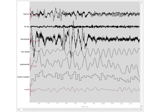mne.datasets.sleep_physionet.age.fetch_data#
- mne.datasets.sleep_physionet.age.fetch_data(subjects, recording=(1, 2), path=None, force_update=False, base_url='https://physionet.org/physiobank/database/sleep-edfx/sleep-cassette/', on_missing='raise', *, verbose=None)[source]#
Get paths to local copies of PhysioNet Polysomnography dataset files.
This will fetch data from the publicly available subjects from PhysioNet’s study of age effects on sleep in healthy subjects [1][2]. This corresponds to a subset of 153 recordings from 37 males and 41 females that were 25-101 years old at the time of the recordings. There are two night recordings per subject except for subjects 13, 36 and 52 which have one record missing each due to missing recording hardware.
See more details in physionet website.
- Parameters:
- subjects
listofint The subjects to use. Can be in the range of 0-82 (inclusive), however the following subjects are not available: 39, 68, 69, 78 and 79.
- recording
listofint The night recording indices. Valid values are : [1], [2], or [1, 2]. The following recordings are not available: recording 1 for subject 36 and 52, and recording 2 for subject 13.
- path
None|str Location of where to look for the PhysioNet data storing location. If None, the environment variable or config parameter
PHYSIONET_SLEEP_PATHis used. If it doesn’t exist, the “~/mne_data” directory is used. If the Polysomnography dataset is not found under the given path, the data will be automatically downloaded to the specified folder.- force_updatebool
Force update of the dataset even if a local copy exists.
- base_url
str The URL root.
- on_missing‘raise’ | ‘warn’ | ‘ignore’
What to do if one or several recordings are not available. Valid keys are ‘raise’ | ‘warn’ | ‘ignore’. Default is ‘error’. If on_missing is ‘warn’ it will proceed but warn, if ‘ignore’ it will proceed silently.
- verbosebool |
str|int|None Control verbosity of the logging output. If
None, use the default verbosity level. See the logging documentation andmne.verbose()for details. Should only be passed as a keyword argument.
- subjects
- Returns:
- paths
list List of local data paths of the given type.
- paths
Notes
For example, one could do:
>>> from mne.datasets import sleep_physionet >>> sleep_physionet.age.fetch_data(subjects=[0])
This would download data for subject 0 if it isn’t there already.
References
Examples using mne.datasets.sleep_physionet.age.fetch_data#

Sleep stage classification from polysomnography (PSG) data